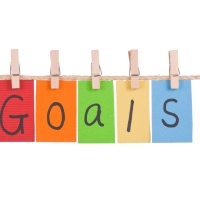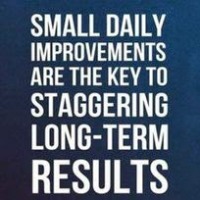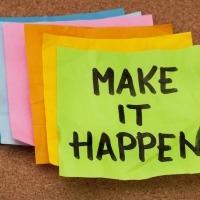“No resolutions, just healthy living.” That’s the post today from a close friend of mine, and it really resonated with me.
I am not a resolutions person. The stats on people keeping them are pretty dismal and sometimes it can feel like you set yourself up for failure because you make the resolutions way too ambitious (i.e., I’m going to work out every day!).
Instead of making resolutions this year, I want to share an exercise I go through at the start of each year, and I hope that you’ll try it with me for 2015.
The New Year is a great time to reflect on the past year and look ahead at what you’d like to see happen in the coming year. I like the idea of being able to look at what worked well for me when it comes to my health and well-being … so I can do more of it … and what didn’t work so well for me … so I can do a whole lot less of it. Life happens and I’m not perfect. But, that doesn’t mean that I just give up on healthy behaviors all together when the fit hits the shan. J
January 1 means a clean slate, so to speak. Starting over with no judgement for the times I may have slipped up or gotten way off track. The important thing is that I know it, and I make the effort to get back on track.
Below are four exercises I’d like you to complete with me:
- Reflecting on the past year
- Thinking about what you’d like to achieve in 2015, then setting up to four outcome goals
- Setting a few smaller behavior goals related to your outcome goals
- Finding support tools, resources or systems (or a person) who can help you track what you’re doing, keep you accountable and motivate you to be consistent
Grab a pen and paper so you can write your answers. Or, copy the text of this blog to a new document on your computer.
If you’re up for it, I would love it if you would email me your answers, or post them on my Facebook page to inspire others.
Reflect on the past year
What worked well?
What didn’t work so well?
What would you like to do differently in the coming year?
 Think about what you’d like to have happen in the coming year and create outcome goals
Think about what you’d like to have happen in the coming year and create outcome goals
Okay, so now that you know what worked well, what didn’t, and what you’d like to do differently, let’s do another exercise. One of my favorite ways to go about making the positive changes I want is by setting outcome goals for what I want to accomplish in the year ahead.
Outcome goals are longer-term goals that are important and the reason for wanting to make a change in the first place. Think of these as your “why.” Once set, you’ll want to refer to these goals periodically because change isn’t easy. There will be times when you’ll feel like giving up or times when you’ll slip up. We all do.
But, keeping focused on your “why” will help you stay connected to the bigger picture—the end result you want to achieve and why it’s so important to you. That connection will help you keep the motivation you need to make good decisions that get you closer to your goals, rather than not so good decisions that take you further from them.
Create up to four outcome goals that reflect what you’d like to accomplish. When you consider what you want and what’s important to you, try to be as specific as you can. Saying something like you want to be healthier is great, but it’s vague. What does that really mean to you? Losing 20 lbs? Sleeping more than 5 hours a night? Reducing your cholesterol by 10 points? Lowering your high blood pressure? Improvements in your physical abilities like strength or endurance? Increased muscle mass?
Here are a couple great examples of outcome goals to get you going:
- I want to grow old gracefully and be able to feel vibrant, energetic and look my best. I want to be able to manage my health organically for as long as possible and be able to take on any activity because I have the strength, balance, endurance and flexibility needed.
- I want to improve upper body strength. That means having toned arms, being able to lift heavy things more easily, performing every tasks without tiring so fast. I’d like to be able to do at least 10 full push-ups.
- I want to heal a recent injury and return to as close to the level of fitness I had pre-injury as I can (without risk of re-injury or further damage). That level of fitness means being able to hike hills for at least 3 miles, and being able to perform a more strenuous, longer strength workout without leg, hip or foot pain.
- I want to find ways to reduce my stress levels and cope with things that are difficult that don’t involve food because it sabotages my healthy eating plan and slows my weight loss.
Do you have a specific timeline for achieving your goal(s)? If so, say more about that.
What type of progress is more important to you? Immediate progress that’s less easily maintained? Maintainable process that may not be as rapid?
Why did you choose the answer you did to the question above?
 Create some behavior goals related to your outcome goals
Create some behavior goals related to your outcome goals
These are the short-term things that you will do daily, weekly or monthly, that will get you closer to your long-term outcome goals.
Behavior goals examples include trying for at least 7 hours of sleep per night or getting three hours of exercise in each week, or completing a six-week cycle of physical therapy sessions or limiting alcohol consumption to only one or two days per week.
 Find Support
Find Support
The last thing I’d like you to do is think of the tools, systems or resources that will help you create lasting habits out of those behavior goals so you can achieve your outcome goals.
Mobile apps or web apps, your calendar, a paper tracking template, an accountability buddy, a social community of people who are trying to achieve the same things you are, a coach or trainer … all of these are options to help you stick with it, pat yourself on the back when you are consistent, or see where you’ve fallen off track so you can get back on track.
What support system, tool or resource makes the most sense for you? Why? What do you need to do to start using it?
Once you’ve answered everything, keep your goals somewhere accessible so you can refer back to them periodically. Especially if you’ve lost your motivation mojo and need to reconnect to your “why.”
Wishing you a happy, healthy New Year!
You'll also receive my Eating for Fat Loss tip sheet with six simple strategies you
can put to use right now.



